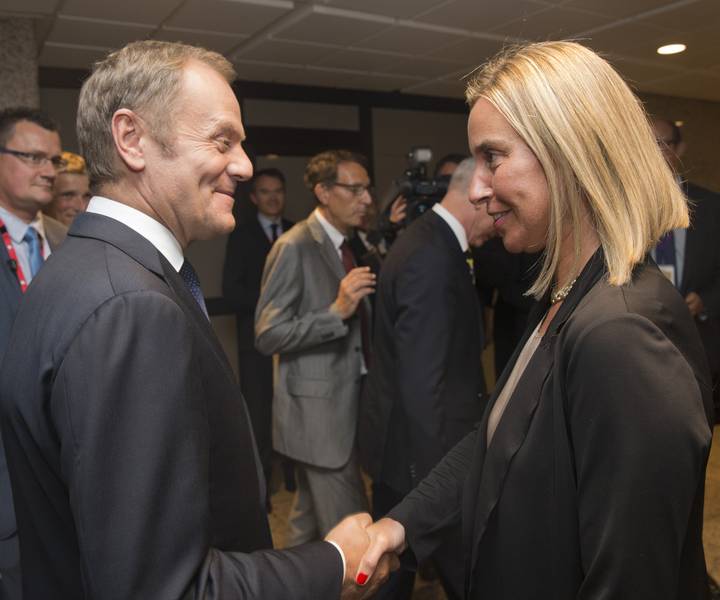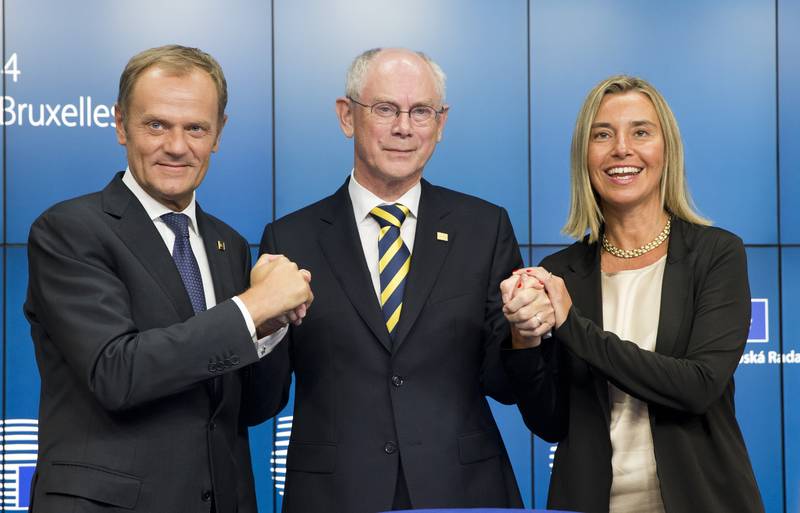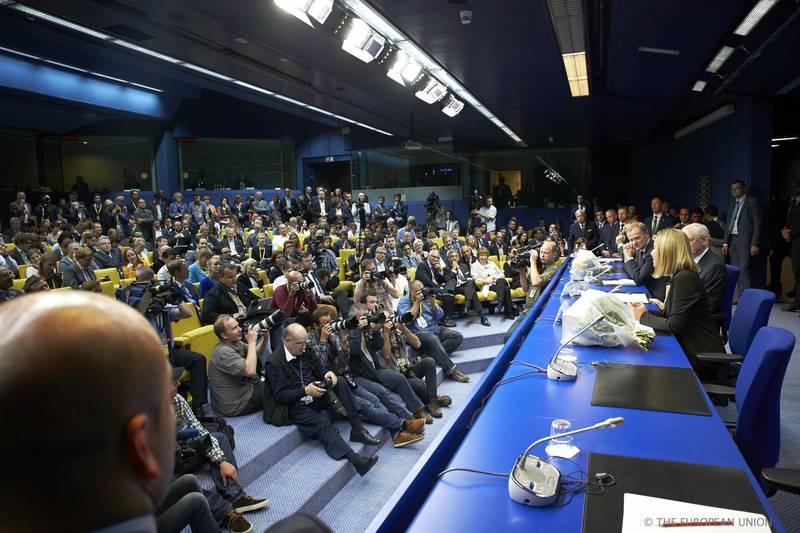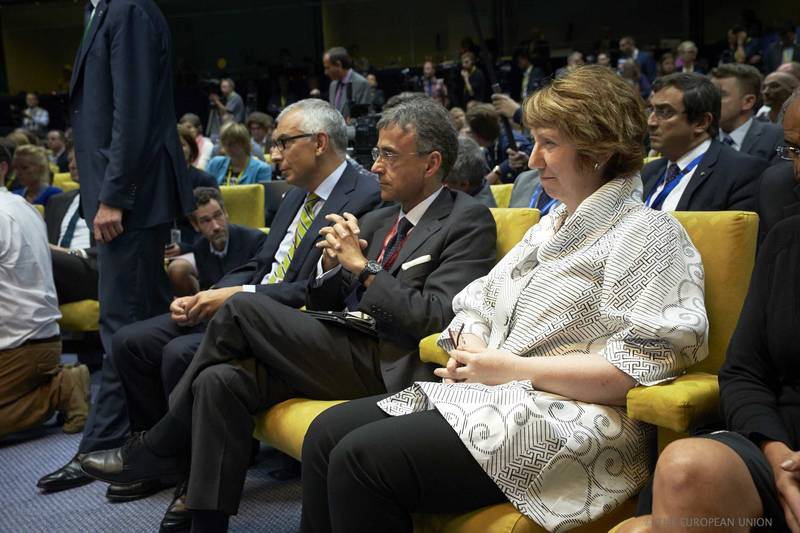The Point of No Return
Adelina Marini, September 15, 2014
 In the EU, there is also a process of realisation of the threat Russia represents. Alas, the divergence in the way the Eastern crisis is being interpreted is still huge in the member states. The good news is that this is a major pillar in the new European Council president's mandate. The bad news, however, is that there is no time. There is another bad news from the long-awaited institutional appointments and it is that for now the "deepening of the integration" in terms of EU's foreign policy is postponed for another time. In the same time, Russia's President Vladimir Putin has been taking advantage with all means available of the lack of unity in EU and is conducting a relentless information and proxy war aimed at punishing Ukraine for wanting to choose a path that is different from what Moscow has prescribed. This is also a warning for everyone who might dare detach from the Russian sphere of influence.
In the EU, there is also a process of realisation of the threat Russia represents. Alas, the divergence in the way the Eastern crisis is being interpreted is still huge in the member states. The good news is that this is a major pillar in the new European Council president's mandate. The bad news, however, is that there is no time. There is another bad news from the long-awaited institutional appointments and it is that for now the "deepening of the integration" in terms of EU's foreign policy is postponed for another time. In the same time, Russia's President Vladimir Putin has been taking advantage with all means available of the lack of unity in EU and is conducting a relentless information and proxy war aimed at punishing Ukraine for wanting to choose a path that is different from what Moscow has prescribed. This is also a warning for everyone who might dare detach from the Russian sphere of influence.
In EU there is still complete perplexity from Russia's actions
The range of interpretation of the Ukraine crisis and Russia's true intentions is very broad within the EU and this is not in the beginning of the crisis, but in the end of August when Crimea has already been captured in violation of international law; when a civil air plane has been shot down over Eastern Ukraine by pro-Russian "rebels" financed and supported by Russia; when economic sanctions have already been imposed and the field for manoeuvre is getting narrower and narrower. Although almost all leaders of the member states spoke that the crisis could not be resolved via military means, many of them rather called the situation "tension", while others spoke openly about a "war". Some countries are in panic, while to others the Eastern crisis is a secondary issue for the EU. And the Union's institutions, while awaiting the new top appointments, seemed like something completely different.
That is why it was extremely important how will the usual horse-trading surrounding the top jobs in EU will reflect the risks and who will the leaders appoint on the key positions - EU foreign minister and president of the European Council (the member states' summits). The outgoing European Commission chief Jose Manuel Barroso described in the most sincere way the situation during the long-awaited EU summit on 30 August. Days before the summit it was already clear who will be the appointees and that is why the main focus of the government leaders was to discuss their common actions. According to Barroso, the behaviour of the Russian leadership is completely inexplicable. "Frankly it makes no sense to have this kind of conflict or kind of new Cold War. I made this point extremely clearly once again to President Putin just yesterday [29 August]".
The contrast is too strong between the repeated commitments to political dialogue and the dramatic reality on the ground, Mr Barroso added. Is it because the end of his term or because of the nature of the crisis, but he completely abandoned the diplomatic tone and expressed very openly his bewilderment. Ukraine, he said, has the right to conclude an association agreement and the EU cannot reject that. The Union is engaged in a dialogue with Russia, the Commission is a facilitator, a working group has been established to search for ways to address Moscow's concerns. "Why then, let's call it with the right word because what is happening in Eastern Ukraine is indeed war, is this still going on? Why?", in complete perplexity continued the former prime minister of Portugal. He said that the conflict has come closer to the point of no return, which means that if there is further escalation it will be impossible to reestablish "the kind of relations that I believe are in the interest of EU and Russia".
But what is in the interest of Russia?
On 29 August, during a youth forum, the Russian president again played a "dialogue" with "Russia's future" during which the young people proved to be very deeply concerned about the developments in Ukraine and very well informed. Vladimir Putin used the "conversation" during the Seliger Youth Forum to present his parallel universe. According to him, former Ukraine President Viktor Yanukovych refused to sign the trade agreement with EU because he believed the document still needed significant additional work. "Our Western partners, with the support of fairly radically inclined and nationalist-leaning groups, carried out a coup d’état there", Putin explained failing to mention that he exercised economic pressure on Yanukovych not to sign the agreement with EU and that he sent quite publicly threats, as well as that his government is funding, equipping and openly supporting not less radically inclined pro-Russian groups.
According to Putin, US and the European countries are involved in a change of power, "an anti-constitutional change of power carried out by force, and the part of the country that does not accept this change is being suppressed with brute military force and the use of planes, artillery, multiple launch rocket systems and tanks. If this is what today’s European values are about, then I am more than disappointed", Mr Putin continued comparing the current situation with the occupation of Leningrad (St. Petersburg). He again omitted to mention his long open and not so open attempts to influence on the political processes in Ukraine and the other states from the Soviet sphere of influence. "There are historians here, and people with their own views on our country’s history might argue with me, but I think that the Russian and Ukrainian peoples are practically one single people, no matter what others might say", Putin concluded thus showing very clearly what his real intentions are - Ukraine is Russian and has no choice of her own and it will be Russian whatever it takes.
Tusk - the best decision EU made in a very long time
Against the backdrop of this statement, which contains more completely incomprehensible for the highly developed democracies theses, the reaction of the European Union on the next day was ... debatable. The leaders came up with completely inadequate to the level of the threat conclusions where they again condemn and reiterate already repeated tens of times statements, they urge for dialogue, to apply the peace plan of Ukraine's President Poroshenko, they condemn the illegal annexation of Crimea, the illegal financial and logistical support for the rebels in Eastern Ukraine, etc. In the same time, as if to counterbalance the weak messages, the 28 have unanimously elected Poland's Prime Minister Donald Tusk to become president of the European Council for the next two years and a half. Furthermore, they appointed him with a very clear mandate - to address the three major challenges for the EU in the coming years: the stagnating economy; the Ukraine-Russia crisis which the current  European Council President Herman Van Rompuy described as "the gravest threat to continental security since the Cold War"; and UK's place in the EU.
European Council President Herman Van Rompuy described as "the gravest threat to continental security since the Cold War"; and UK's place in the EU.
Mr Tusk's appointment has a huge significance and is multi-layered both internally for the EU and externally. He is a symbol of the difficult compromise that had to be made between the interests of the member states, the interests of the Union as a community, between the rudimentary common foreign policy and the need of a deeper approach, the energy security, the economic crisis, between new and old member states, north and south. Before the decisive EU summit on August 30 it seemed that from a foreign policy point of view it would be best the leaders to choose Poland's Foreign Minister Radek Sikorski instead of the unexperienced Italian Federica Mogherini. With such a mandate and his experience, Donald Tusk is an excellent choice for such a position, which was evident in his very first statements after his appointment was formally announced.
Tusk is one of the veteran prime ministers in EU - he has held the position since 16 November 2007. He is born in Gdansk - a city-symbol of the Polish fight for independence from the USSR. Mr Tusk is a co-founder of the Independent Students' Association in Gdansk, a leader of the Solidarity movement at the Wydawnictwo Morskie publishing house and he worked as a journalist of the Samorządność weekly. During his rule, Poland was the only EU country that did not fall into recession and even scored remarkable economic growth. In this period, the country has turned from a "new" into an "old" and very influential member of the EU. In the beginning, it seemed a natural speaker of the eastern block, but this did not happen because of resistance from some countries in the region. Nonetheless, Warsaw worked hard to consolidate the positions of the countries from the eastern part of the EU on European issues.
Besides, the first Polish presidency was very successful and left strong impression both in the old member states and in the European Parliament. Warsaw took over the presidency in a very crucial moment for the EU when the negotiations on the new multiannual financial framework of the Union until 2020 were to start and also when the reform of the EU economic governance was being written that deepened the integration, especially in the euro area. Warsaw played a crucial role in preventing a two-speed Europe. With all this and also with his consistent policy toward the countries from the Eastern Partnership, as well as with his attempts to restore relations with Russia, Donald Tusk and his government earned huge respect in the Community.
After the announcement of his appointment, Donald Tusk, strongly criticised for his bad English, demonstrated qualities of a strong leader in the very first moments. In the very beginning, he outran the journalists' questions, circling around his lack of knowledge for foreign languages, by promising that by December 1st, when he will officially take the post, he will be good with English. He even showed sense of humour (a very respected quality among the journalistic crowd in Brussels) by, with his little knowledge of English, playing a game of words promising to "polish his English". According to him, his main advantages are that he brings the Eastern European experience and energy - something the EU needs badly. Against the backdrop of the clear trends of return of totalitarianism and rapprochement to Russia by some member states, which is a basis for serious tensions within the Union, the appointment on this position of a person from the region with Poland's belief in the "European dream" is an excellent decision.
This is good news not only for the failing "new" member states, like Bulgaria and Hungary, for instance, but also for many of the old countries where nationalism, xenophobia and anti-European moods are gaining strength very fast. Tusk recalled that 80% of the Poles believe in the EU and "do not seek alternative to the Union". "I'm convinced that there is no intelligent alternative to the EU", Tusk added. He committed to seek a common position on all important issues - from Ukraine to Libya and the other challenges, underscoring that he will base his approach on the EU strategic guidelines, adopted at the June EU summit. And if then I criticised these guidelines for being too vague, in fact their vagueness will untie Donald Tusk's hands. To him, a priority number one is the Eastern crisis. His overall performance on August 30 was very inspiring against the backdrop of the quite dim feelings in the EU, especially after the European elections. What I missed in his statements, though, is that he failed to  mention enlargement, especially to the Western Balkans, an important part of which are also subject of strong Russian influence.
mention enlargement, especially to the Western Balkans, an important part of which are also subject of strong Russian influence.
He promised to be a bridge between the euro- and non-euro area countries. His experience as a prime minister of a country with strong fiscal discipline but also with solid economic growth, as well a champion in absorbing EU funds, will be a very strong partner of the other very strong figure in the EU - the new European Commission chief. Also a veteran prime minister - Jean-Claude Juncker.
Federica Mogherini - just a messenger
Donald Tusk's election, as well as his mandate to develop a common EU position on the Russia-Ukraine relations, shows that the Union's foreign policy will remain in the hands of the European Council and will be led mainly by the heads of state. In this regard, the election of the young Italian Foreign Minister Federica Mogherini is not such a bad news as it seemed initially. There is not much to be said about her except that she significantly changed her views after her appointment. She has been a foreign minister since February this year and is 41 years old. To many, she is too young and has too little institutional experience to be able to fill the position of a high representative of the EU foreign policy. Since July 1st, her function was enhanced because of Italy taking the rotating Council presidency. However, in the period from July 1st till August 30th, the Eastern crisis was not a priority to her and Ukraine was rarely mentioned.
Moreover, in the priorities of the presidency, the crisis is almost not mentioned at all and Russia is described as a strategic partner of the EU. During her hearing in the foreign affairs committee of the European Parliament on September 2, in her capacity as representative of the Presidency, Ms Mogherini acknowledged that the preparation of the priorities is often done long before the start of the presidency and that is why they often do not correspond entirely to the realities. She said, that nevertheless, she would change only one sentence in them and that is to say that Russia is no longer a strategic partner of the EU. It is very telling that Federica Mogherini was very cautious during her first presser after being appointed, but she relaxed during her conversation with MEPs. Then, she mentioned enlargement, spoke in detail about Ukraine, which emerged as a major priority.
All this shows that Federica Mogherini will learn on the fly and will try to fit the role of a high representative of the EU for foreign policy. What will make this task hard, though, is that it is less and less clear what exactly this position does. As euinside wrote, the functions of the high rep have been enhanced with the Lisbon Treaty, but they continued to be quite vague. The first high representative after the entry into force of the Treaty, is UK baroness Catherine Ashton, whose main task was to build the European External Action Service, to create the procedures and to supervise the selection of heads of the EU's "embassies" around the world, as well as to try and fulfil the, as it proved, the most difficult task - to make the EU speak with a single voice. And if the establishment of the external action service and all the relevant procedures and rules is rather technical work, Catherine Ashton will be remembered with the Brussels agreement for normalisation of the relations between Serbia and Kosovo which opened the door for Serbia to start accession negotiations.
However, this is only a small step toward the resolution of one of the biggest jigsaw puzzles in the Balkans. The hard work is yet to be done. Besides, the EU less than ever is talking with a single voice which makes the task of the unexperienced, but charming, Federica Mogherini very difficult. And with a president of the European Council like Donald Tusk, it might appear that her role would be rather representational. She will work rather as a messenger and coordinator instead of being a policy maker. Her election is the result of the need to achieve a complicated internal European compromise that reflects multiple interests at various levels. One thing, though, is certain. With Donald Tusk at the helm of the European Council, a new path is being opened for development of the EU. A path where personality will matter more than the post. The top jobs in the EU are with very unspecific mandates and t hat is why it is very important who is holding them. This is growingly important for the European Commission, too, whose formation will be reviewed in a separate article.
hat is why it is very important who is holding them. This is growingly important for the European Commission, too, whose formation will be reviewed in a separate article.
The only thing that could stir EU's plans, which are moving with a different speed, are Russia's further actions. According to Lithuania's President Dalia Grybauskaite, however, any changes are a task for NATO. "Russia is practically at war with a country that wants closer integration with Europe. This means that Russia is practically at war with Europe", she said before the beginning of the 30 August summit and added: "Better to expect more from NATO. I'm very happy that their approach is realistic. They have the facts on the table. We shouldn't lie to ourselves and listen to the lies of Putin". It is important to add that a large part of the EU member states are also members of NATO. This means that if they do not speak with one voice within the Pact, it will be unable to respond adequately to the Russian threat. Or any threat for that matter. If the EU was able to buy time to solve the euro area debt crisis, this is no longer possible. The time is not on EU's side but on the evil's side. Our hopes lie with Donald Tusk and let us hope that his lack of knowledge for foreign languages will not be an obstacle in this crucial time for the EU.
 Federica Mogherini | © Council of the EU
Federica Mogherini | © Council of the EU | © Council of the EU
| © Council of the EU Luis De Guindos | © Council of the EU
Luis De Guindos | © Council of the EU